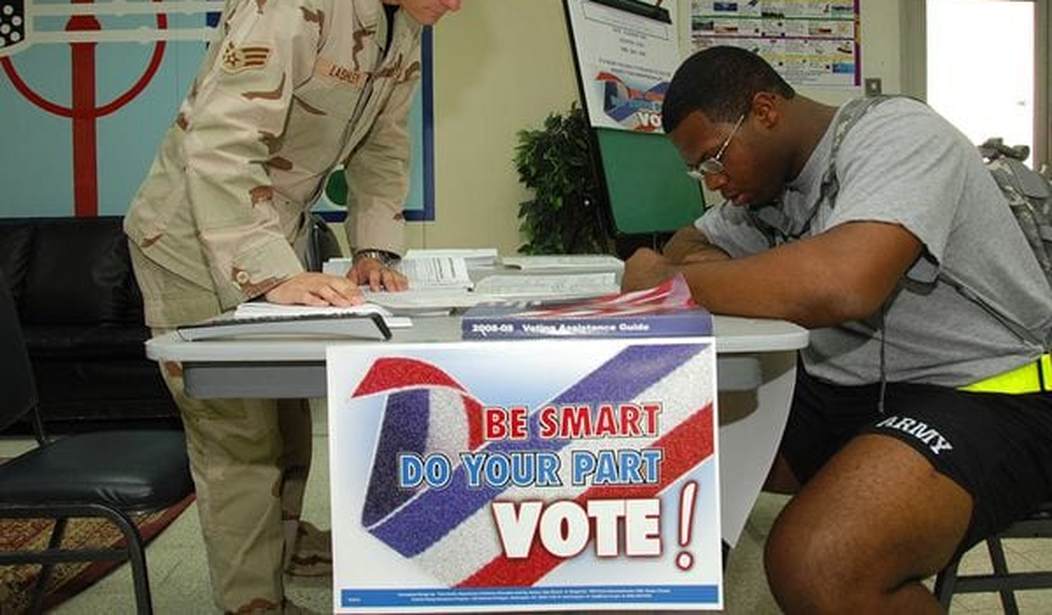Almost no one has noticed that the Obama administration is waging war administratively against the voting rights of America’s warriors overseas.
This bureaucratic assault comes in the form of the Obama administration’s unconscionable foot-dragging on the implementation of the Military and Overseas Voter Empowerment (MOVE) Act, which President Obama signed into law in 2009. The legislation passed, in part, because the nonpartisan Military Voter Protection Project discovered in 2008 that under 20 percent of 2.5 million military personnel voted by absentee ballot. By 2010 that figure had shriveled to just 5 percent.
But the Obama administration, which moves at light-speed to undermine common-sense state voter identification laws, hasn’t bothered to set up half of the installation voting assistance offices (IVAOs) required under the MOVE Act. The law was created to help deployed soldiers, many of whom are constantly on the move, to exercise the right to vote that they risk their lives to protect. IVAOs are supposed to help military personnel find their way through the maze of confusing voting rules enforced by the nation’s 55 states and territories.
But IVAOs can’t help anybody vote if they don’t exist. By Washington standards, setting them up properly would cost a pittance. Creating IVAOs as required by the law would cost just $15 million to $20 million per year in this era of Obama-approved annual trillion-dollar deficits.
This effort to prevent deployed soldiers from voting comes as the Obama administration and its allies endlessly hype phantom voter suppression here at home, accusing grassroots good-government groups like True the Vote of voter intimidation, while giving aid and comfort to nightstick-equipped storm troopers from the New Black Panther Party.
Do you think the administration’s lack of interest in protecting soldiers’ votes could have something to do with the fact that military personnel tend to lean Republican? Mitt Romney scored the support of 58 percent of the military compared to President Obama’s 34 percent in a Gallup poll this past May.
You may be forgiven for not knowing about this civil rights travesty-in-progress because the recent congressional hearing that exposed this sad state of affairs was virtually ignored by the mainstream media.
Former Ambassador Kenneth P. Moorefield, a deputy inspector general at the Department of Defense, found that the DoD hadn’t gotten around to establishing half of the IVAO facilities that are supposed to be in 229 overseas military installations.
In addition, the website of the Federal Voting Assistance Program (www.fvap.gov), which was created to help uniformed service members, their families, and U.S. citizens living outside the U.S., contained inaccurate information, he told the House Armed Services Committee’s military personnel panel.
The FVAP website is so awful that it gave the wrong deadline for Wisconsin voters. As MacIver News Service reported, the website had indicated incorrectly that ballots had to be received in America’s Dairyland by November 16. In fact, Wisconsin-bound ballots must be received no later than November 9, the Friday after Election Day.
“Had this error not been corrected, thousands of Wisconsin servicemen and women could have been disenfranchised in this key swing state this November,” said MacIver.
Appearing before the subcommittee on September 13, Pam Mitchell, acting director of the Federal Voting Assistance Program, brushed off the report. “I strongly believe that voting-assistance is the best that it has ever been,” she said.
Mitchell was vigorously cross-examined by Reps. Allen West (R-Fla.) and Austin Scott (R-Ga.).
“So are we on the right track to get the intent of this law implemented before we have the sixth of November?” asked West.
“I mean, are we moving in the right direction? … I have friends and families who are starting to feel a little disenfranchised. That’s the truth about what they’re saying to me.”
Mitchell passed the buck, saying it was the responsibility of the various branches of the military to set up the IVAOs.
West countered that “this law gave the responsibility to your office to be able to make sure that that stuff happened.”
Rep. Scott said it was “borderline negligence” for the Pentagon not to set up the required IVAOs. “It sure seems to me that the DoD could do it if they wanted to.”
In mid-2010, the Pentagon excelled at getting lengthy surveys about President Obama’s pet issue, “don’t ask, don’t tell,” to 200,000 soldiers overseas, Scott said, but when it comes to military voting “the effort is certainly subpar.”
Scott’s onto something.
Six U.S. senators have asked the Pentagon to make a serious good-faith effort to protect the votes of military personnel. “The price of [the Department of Defense’s] failure to follow the law will likely be paid this November by military service members and their families, whose voting rights were to have been safeguarded by this provision,” according to the letter signed by Sens. John Cornyn (R-Texas), Kelly Ayotte (R-N.H.), John Barrasso (R-Wyo.), Richard Burr (R-N.C.), Saxby Chambliss (R-Ga.), and James Inhofe (R-Okla.).
The Obama administration has every reason to believe it can successfully disenfranchise America’s fighting men and women.
In America, soldiers can’t talk back to their commander-in-chief.












Join the conversation as a VIP Member